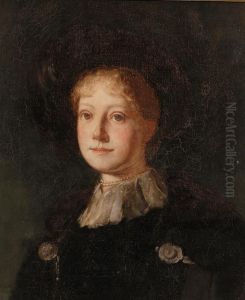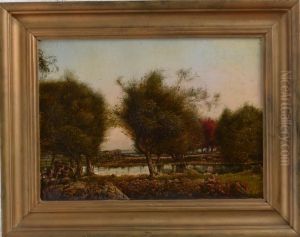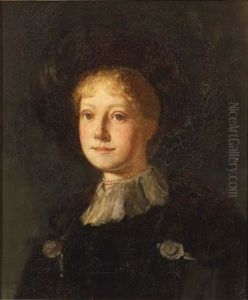Ernest Francisco Fenollosa Paintings
Ernest Francisco Fenollosa was an influential figure in the introduction of Japanese art and culture to the Western world during the late 19th and early 20th centuries. Born on February 18, 1853, in Salem, Massachusetts, Fenollosa developed an interest in Asia while studying philosophy and sociology at Harvard University, where he graduated in 1874. Following his graduation, he was invited to Japan in 1878 by the Japanese government to teach political economy and philosophy at Tokyo Imperial University. This move marked the beginning of his lifelong engagement with Asian art and culture.
During his time in Japan, Fenollosa's interest shifted towards the preservation of traditional Japanese art forms, which were at the time undervalued and often destroyed in the rush towards modernization and Westernization. He traveled extensively throughout Japan, studying and collecting art objects, and played a crucial role in the establishment of the Tokyo Imperial Museum (now Tokyo National Museum) in 1882. Fenollosa also helped to found the Tokyo School of Fine Arts (now Tokyo University of the Arts) to encourage the preservation and continuation of traditional Japanese art techniques.
Fenollosa's efforts were not limited to Japan. He worked tirelessly to promote Eastern art in the West, arguing for its aesthetic value and philosophical depth. After returning to the United States in 1890, he lectured widely on Asian art and culture and became the curator of the Department of Oriental Art at the Museum of Fine Arts, Boston. Fenollosa's collection of Asian art, much of which he donated to the museum, formed the core of its prestigious Asian art collection.
One of Fenollosa's most lasting contributions was his work on Japanese art history and theory. He collaborated with Okakura Kakuzo, another pivotal figure in the preservation of Japanese arts, and his writings helped to introduce and explain the complexities of Asian art to a Western audience. His efforts greatly influenced the American appreciation of Asian aesthetics, contributing to the rise of Japonisme in Western art and design.
Ernest Francisco Fenollosa passed away on September 21, 1908, in London, England. Though his methods and interpretations have been subject to critique and reassessment over time, his passion for and contributions to the understanding and appreciation of Asian art remain undisputed. Fenollosa's legacy is evident in the continued interest and respect for Asian art within Western collections and institutions.


